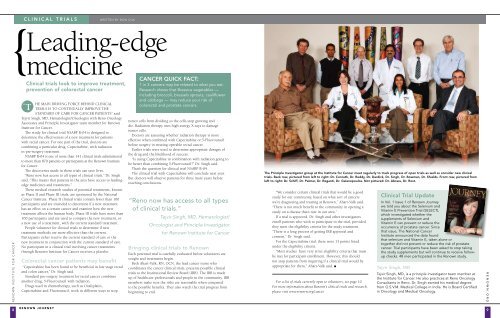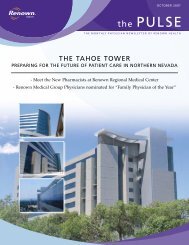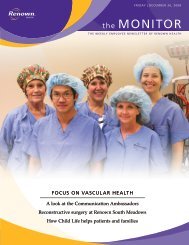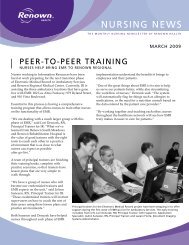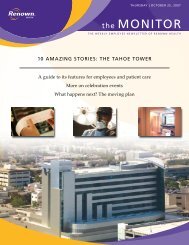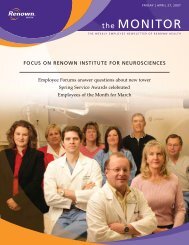Conquering Colon Cancer - Renown Health
Conquering Colon Cancer - Renown Health
Conquering Colon Cancer - Renown Health
Create successful ePaper yourself
Turn your PDF publications into a flip-book with our unique Google optimized e-Paper software.
<strong>Renown</strong> institute foR canceR<br />
8<br />
cLiNicaL triaLs WRITTEN by DoN Cox<br />
leading-edge<br />
medicine<br />
clinical trials look to improve treatment,<br />
prevention of colorectal cancer<br />
“ T<br />
he maIn dRIvIng foRCe BehInd ClInICal<br />
tRIals Is to ContInually ImpRove the<br />
standaRd of CaRe foR CanCeR patIents” said<br />
tejvir singh, md, hematologist/oncologist with Reno oncology<br />
associates and principle Investigator team member for <strong>Renown</strong><br />
Institute for <strong>Cancer</strong>.<br />
the study for clinical trial nsaBp R-04 is designed to<br />
determine the effectiveness of a new treatment for patients<br />
with rectal cancer. for one part of the trial, doctors are<br />
combining a particular drug, Capecitabine, with radiation<br />
in pre-surgery treatment.<br />
nsaBp R-04 is one of more than 141 clinical trials administered<br />
to more than 870 patients or participants at the <strong>Renown</strong> Institute<br />
for <strong>Cancer</strong>.<br />
the discoveries made in those trials can save lives.<br />
“Reno now has access to all types of clinical trials,” dr. singh<br />
said. “this means that patients in the area have access to leadingedge<br />
medicines and treatments.”<br />
these medical research studies of potential treatments, known<br />
as phase II and phase III trials, are sponsored by the national<br />
<strong>Cancer</strong> Institute. phase II clinical trials contain fewer than 100<br />
participants and are intended to determine if a new treatment<br />
has an effect on a certain cancer and examine how the new<br />
treatment affects the human body. phase III trials have more than<br />
100 participants and are used to compare the new treatment, or<br />
a new use of a treatment, with the current standard treatment.<br />
people volunteer for clinical trials to determine if new<br />
treatment methods are more effective than the current.<br />
participants either receive the current standard of care or the<br />
new treatment in conjunction with the current standard of care.<br />
no participant in a clinical trial involving cancer treatments<br />
through <strong>Renown</strong> Institute for <strong>Cancer</strong> receives a placebo.<br />
colorectal cancer patients may benefit<br />
“Capecitabine has been found to be beneficial in late stage rectal<br />
and colon cancer,” dr. singh said.<br />
standard pre-surgery treatment for rectal cancer combines<br />
another drug, 5-fluorouracil with radiation.<br />
drugs used in chemotherapy, such as oxaliplatin,<br />
Capecitabine and fluorouracil, work in different ways to stop<br />
<strong>Renown</strong> joURneY<br />
caNcer QuicK Fact:<br />
1 in 3 cancers may be related to what you eat.<br />
Research shows that brassica vegetables —<br />
including broccoli, brussels sprouts, cauliflower<br />
and cabbage — may reduce your risk of<br />
colorectal and prostate cancers.<br />
tumor cells from dividing so the cells stop growing and<br />
die. Radiation therapy uses high-energy X-rays to damage<br />
tumor cells.<br />
doctors are assessing whether radiation therapy is more<br />
effective when combined with Capecitabine or 5-fluorouracil<br />
before surgery in treating operable rectal cancer.<br />
earlier trials were used to determine appropriate dosages of<br />
the drug and the likelihood of success.<br />
“Is using Capecitabine in combination with radiation going to<br />
be better than combining 5-fluorouracil?” dr. singh said.<br />
that’s the question for clinical trial nsaBp R-04.<br />
the clinical trial with Capecitabine will conclude next year.<br />
But doctors will observe patients for three more years before<br />
reaching conclusions.<br />
“reno now has access to all types<br />
of clinical trials.”<br />
Tejvir Singh, MD, Hematologist/<br />
Oncologist and Principle Investigator<br />
for <strong>Renown</strong> Institute for <strong>Cancer</strong><br />
bringing clinical trials to renown<br />
each potential trial is carefully evaluated before volunteers are<br />
sought and treatments begin.<br />
Beth ahart-valk, Rn, oCn, the lead cancer nurse who<br />
coordinates the cancer clinical trials, presents possible clinical<br />
trials to the Institutional Review Board (IRB). the IRB is made<br />
up of healthcare professionals and people in the community. IRB<br />
members make sure the risks are reasonable when compared<br />
to the possible benefits. they also watch the trial progress from<br />
beginning to end.<br />
the Principle investigator group at the institute for cancer meet regularly to track progress of open trials as well as consider new clinical<br />
trials. back row, pictured from left to right: Dr. conrath, Dr. reddy, Dr. Dardick, Dr. singh, Dr. bowman, Dr. shields. Front row, pictured from<br />
left to right: Dr. schiff, Dr. Palmer, Dr. reganti, Dr. Galanopoulos. Not pictured: Dr. abrass, Dr. rost.<br />
“we consider certain clinical trials that would be a good<br />
study for our community, based on what sort of cancers<br />
we’re diagnosing and treating at <strong>Renown</strong>,” ahart-valk said.<br />
“there is not much benefit to the community in opening a<br />
study on a disease that’s rare in our area.”<br />
If a trial is approved, dr. singh and other investigators<br />
enroll patients who wish to participate in the trial, provided<br />
they meet the eligibility criteria for the study treatment.<br />
“there is a long process of getting IRB approval and<br />
consent,” dr. singh said.<br />
for the Capecitabine trial, there were 13 points listed<br />
under the eligibility criteria.<br />
“most studies have very strict eligibility criteria that must<br />
be met for participant enrollment. however, this should<br />
not stop patients from inquiring if a clinical trial would be<br />
appropriate for them,” ahart-valk said. ■<br />
For a list of trials currently open to volunteers, see page 10.<br />
For more information about <strong>Renown</strong>’s clinical trials and research,<br />
please visit www.renown.org/cancer.<br />
clinical trial update<br />
In Vol. 1 Issue 1 of <strong>Renown</strong> Journey<br />
we told you about the Selenium and<br />
Vitamin E Prevention Trial (SELECT),<br />
which investigated whether the<br />
supplements of Selenium and<br />
Vitamin E can prevent or reduce the<br />
occurrence of prostate cancer. Since<br />
that issue, The National <strong>Cancer</strong><br />
Institute announced the data found<br />
that selenium and Vitamin E, taken alone or<br />
together did not prevent or reduce the risk of prostate<br />
cancer. Trial participants have been asked to stop taking<br />
the study supplements but will continue to receive followup<br />
checks. 48 men participated in the <strong>Renown</strong> study.<br />
tejvir singh, mD<br />
Tejvir Singh, MD, is a principle investigator team member at<br />
the Institute for <strong>Cancer</strong>. He also practices at Reno oncology<br />
Consultants in Reno. Dr. Singh earned his medical degree<br />
from G.S.V.M. Medical College in India. He is board Certified<br />
in oncology and Medical oncology.<br />
renown.org 9


